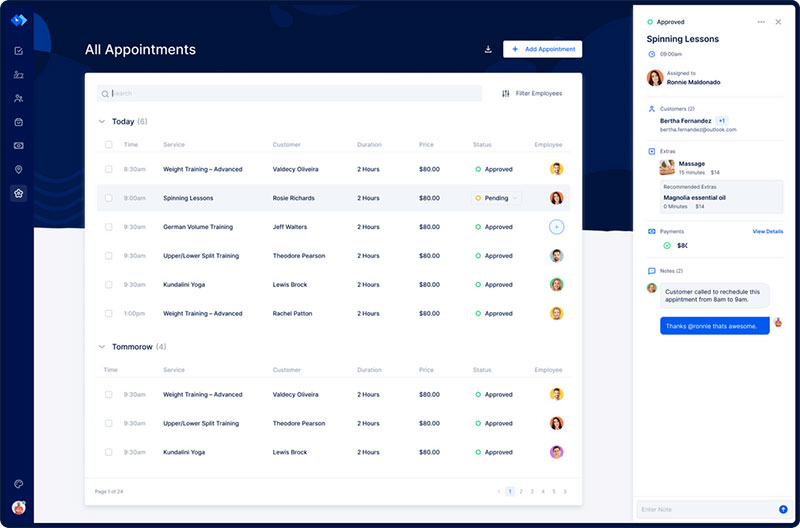The benefits of group mentoring are huge and widely known by everyone. However, a mentoring program can have different perspectives. You’ll find programs of one-to-one sessions, reverse mentoring, and others.
Any program is beneficial because it helps boost engagement and fosters a culture of tolerance. Diversity and inclusion are keywords when it comes to traditional mentoring.
Group mentoring may be the best approach when it comes to these values. It provides a versatile environment, especially when compared to traditional mentoring, but it comes with its challenges. While group mentoring has a wider reach, it also requires a fair amount of effort.
This article describes the difference between traditional and group mentoring. Readers will discover the advantages, uses, and basics of managing mentoring groups.
Group Mentoring Program Definition
What is group mentoring? These programs involve a professional working with multiple mentees. Thus, mentors impart the knowledge they have gained regarding their field of specialty to mentees. In general, they have similar goals to reach. Likewise, they may need a similar set of skills.
If you’re not familiar with the mentoring culture, you may not distinguish the difference between a classroom and a group mentoring program. However, there are some key differences.
Firstly, the mentees drive the relationships, unlike teacher-student agreements. In this way, group mentoring is similar to one-to-one sessions. Mentees have their own learning goals which may differ from the goals of others.
Nonetheless, group mentoring relationships are based on support. Participants help each other and gain access to new knowledge. Also, both mentors and mentees benefit from this dynamic because everyone can learn from the discussions. All in all, group mentoring programs are most suitable for those who learn better in a collaborative environment.
During mentoring sessions, mentees achieve their learning objectives through different methods. Knowledge sharing and activities are some of them. Also, they can answer questions and share their concerns.
But don’t feel you have to be stuck in one mentoring definition. There’s the possibility to combine mentoring groups with one-on-one sessions. Choose the approach that best suits the participating parties’ development goals.
With that in mind, consider the different types of mentoring programs. Each of them has added benefits, so it’s important to entertain them all.
One Mentor Working with Multiple Mentees
Workplaces can set up team mentoring for several reasons. For example, there may be a lack of staff to maintain one-on-one mentoring sessions.
Nonetheless, this shouldn’t be seen as a hindrance. Instead, mentoring groups can significantly help all those involved.
Several Mentors Working with Multiple Mentees
Setting up sessions with several professionals can be a great path toward leadership development. Organizations can hold these sessions in person or online. Such an approach helps all participants because they can get different perspectives.
Peer Mentoring Program
Knowledge sharing is a powerful tool, especially for large entities. By encouraging this exchange between different departments, you’ll be creating a solid company culture. Peer mentoring works best among teams that work remotely. Thus, someone from sales can share employee experience with an IT expert.
Facilitated Group Mentoring
Mentoring groups open a whole world of possibilities. Other mentees can influence your journey. What could be better than learning from other people’s success and expertise? Besides, it always helps to get a fresh perspective.
This doesn’t undermine the figure of the qualified mentors, but you can also get great feedback from your peers.
When to Choose Mentoring Groups as Your Strategy
Mentoring groups have better results than traditional mentoring. This is especially so when it comes to working with a team. When there are several people with similar learning needs, this is a great approach. Group mentoring is mostly about collaboration and teamwork. You can choose this approach for several cases.
Onboarding processes: If you have new employees to introduce, mentoring groups can be a great vehicle to do it successfully. They’ll be able to understand the company culture, get key knowledge, and improve their networking. You can also use your sessions to build relationships across departments.
Retaining knowledge: Every time an employee retires or leaves, a piece of your company’s knowledge goes with him/her. Through a group mentoring program you can transmit key business knowledge quickly. It’s also a great way to prevent knowledge attrition by fostering a learning culture.
Expertise and knowledge sharing: Group mentoring can be an excellent way to develop your company. Match the right mentors with your staff, and you’ll have an affordable training session. It is not necessary to hire external professionals when you can handle it all through a group mentoring program. This is a win-win situation as your mentors will develop valuable leadership skills.
All in all, team mentoring is ideal for short transitions. It’s also a great solution when you don’t have enough staff to arrange a one-on-one mentoring program. It is also recommendable for onboarding processes and special cases. For instance, if you have group members with high qualifications.
Benefits of Mentoring Groups

A mentoring relationship benefits everyone: the company, mentors, and mentees. Participants can acquire new skills and knowledge. A mentoring group can also generate the following perks.
Develop Leadership
Mentors and mentees can develop their leadership skills thanks to their mentoring relationship. The responsibility that comes with guiding, teaching, and coaching is huge. Hence, mentors have quite a meaningful experience. They will gain confidence and improve their mentoring strategies.
Group mentoring creates benefits for mentees as well. One such benefit is the possibility of career development.
Build a Learning Culture
If you want your company to have a solid learning culture, you have to consider certain aspects. For example, you have to make plenty of resources available and make development the most valuable asset. It’s important that your employees learn from their mistakes, rather than get frustrated. A group mentoring program helps you build such a culture.
Allow your employees to grow in a safe environment, and you’ll see positive results. Thus, they are more likely to seize the opportunity and encourage others to do the same.
Engagement
Some employees don’t feel comfortable with one-on-one mentoring, especially if they have to meet with one of the senior leaders. Group mentoring takes personal chemistry out of the table allowing for multiple points of view. Through a group discussion, you can enhance your employees’ communication skills. Besides creating a sense of community, you’ll be allowing the examination of ideas and issues. Needless to say, it generates more learning opportunities.
Improve Communication Skills
Teaching processes require good communication. All parties must understand each other. Thanks to the mentoring group, senior employees can share their knowledge and develop stronger communication.
Increase Learning
Both the mentees and mentors benefit from their mentoring group. Through a discussion, they can get perspective and gain new insights.
Build a Community
Your employees may or may not have previous connections. By working in a group setting, they can support each other to become the best versions of themselves. This will create a sense of community and encourage development.
No matter how many mentees you have, one mentor can make a difference. A supportive environment can work miracles and help people to grow.
Share Knowledge
The exchange of skills is important in any working environment. In line with this, there are two types of knowledge, explicit and tacit.
Explicit knowledge comes from procedures and documents. On the other hand, tacit knowledge comes from intuition and experience.
Thus, mentors can share advice, documents, and resources to transmit explicit knowledge. When it comes to tacit knowledge, they can discuss problems and find solutions. Sharing observations is also useful.
Your mentorship success story starts with a scheduling app to streamline your calendar
Staying organized has never been easier.
You can now manage your business and grow your brand with a single, powerful software that keeps all of your appointments in line, your clients organized and your business booming.
Trafft is perfect for business owners who need to streamline their booking experience both for their staff and their clients.
Trafft handles everything for you, even sending automated email or SMS reminders to your clients. No-shows? Not anymore!
The Trafft booking software adapts to different industries for a blissful online booking experience and employee management.
https://www.youtube.com/watch?v=aGbUg7PVtLk
Want to know more? Check out Trafft’s awesome features to see what you are missing.
How to Start a Group Mentoring Program
The next guidelines will help you start a group mentoring program.
Establish the Goals
The first step is to decide what you want to accomplish. Thus, establish what you should achieve, how to measure success, and how your goals connect with your business objectives. Also, determine what you expect from both mentors and mentees.
Working towards a common goal is vital in group mentoring. Recognize how the group will benefit and how this will help the company. Also, this process will help you learn more about your employees.
Choose a Group Structure
Will you assign multiple mentors or only one? How many participants will you have? Usually, groups have from one to three mentors and five to 15 mentees.
Put together a fairly large group, and you’ll have plenty of sharing opportunities. With 20 people in a group you’ll have a size that will allow everyone to participate while having a variety of points of view.
The next task is to select the people. Although this might seem overwhelming, it can mean the failure or success of the program. Capitalizing on existing knowledge and skills is vital. However, be willing to invite new members that may bring innovative teaching skills.
Leadership Support
If your group leaders advocate for your program, you’ll have a great advantage. Having the support and participation of senior employees is definitely a plus.
This approach will also help you find qualified mentors, unlock new resources for your organization, and use them during the group sessions. If you’re having trouble onboarding leaders, a white paper might help you build a case to promote your program.
Assign Facilitators
Both in-person and online mentoring sessions must have facilitators. This is the key to a good start and a solid process. Your facilitator will help you stay focused on the goals, moderate instructions, and encourage participants. They are also vital to introduce the group during the first session and to clarify everyone’s expectations.
As the group advances, the facilitator can take on other roles. For example, they can oversee the needs of the mentees. They can pose questions, create new objectives, and help mentors stay on track. All in all, they are responsible for driving the activities and moving the group in a positive direction. Once this is done, the facilitator should slowly back down and let the group develop.
Develop a Plan
All mentoring programs must have clear objectives. This is the key to successful mentoring, regardless of the type of sessions (in-person or group).
At this point, you must choose the action plan for your program and make the time to hold the sessions. Think carefully about how to form teams. You can team them up by department or qualifications.
Without a solid plan, you’ll probably generate confusion. As a result, motivation will diminish and it will be harder to reach the goals.
Be Aware of Individual Issues
Entering into a relationship can be challenging. Naturally, a mentoring group is formed by people with different characters. Mindsets can also be different, which has the potential to generate issues. It’s key to identify these issues and solve them in time. Otherwise, the program objective will be at risk.
Attend every issue, talk to the participants, and encourage communication. This type of environment requires that everyone speaks openly about their problems. Honest communication is the basis of understanding and solving issues.
Support the Program Along the Way
Kickstarting the group mentoring program is important but not all that’s required. Like a child, your group will need support as it develops. Include mentor training that involves key topics. This includes how to build relationships, how to handle conversations, and how to manage one’s expectations.
Make sure you provide mentees and mentors with all the resources they need. Mentoring guides, topical content, best practices, and program policies will be of great help.
Appoint a group mentoring manager and make sure they check in regularly. This is the person that will help you keep the process on the right track. Finally, give participants space to express themselves. It’s important that they talk about their concerns openly and feel comfortable doing so.
Understanding the Dynamic of the Group
Group mentoring follows the “forming, storming, norming” rule.
The forming stage is when participants depend mostly on the leader for guidance. As days pass, mentees settle in, and they move into the storming period. This is a more challenging stage. Participants test the leaders and there are usually power struggles.
When the participants reach an agreement, the norming period steps in. Now responsibilities are set up. Also, group members learn to respect each other and appreciate skills. The group will eventually reach this stage no matter the struggles that happened before.
If your facilitator understands this dynamic, they will be able to set up the right time frames. By knowing what to expect at each stage, it’s possible to manage activities so that the group reaches the goal.
Use the Benefits of Technology
Small groups are ideal for effective mentoring. However, extending the groups’ reach through technology is a great option. These tools allow you to make information available. It also provides a common communication point and a monitoring system.
Modern mentoring programs offer self-service setup tools. Thus, employees can also form groups. They can add tags and filters to quickly find groups that interest them.
Establish the Program’s Duration
Establish the starting and closing date of the program. Naturally, the relationships you foster in mentoring groups can last a lifetime. However, the sessions must have a stipulated period. Online programs can last longer and have participants come and go throughout its lifetime. This is possible thanks to digital tools.
KPI Measurement
Tracking progress is vital. Measure the participants’ KPIs to assess your distance to the goal. Program administrators can get valuable insights and generate reports. Various tools can help you track the group’s progress.
FAQs about mentoring groups
1. What is a mentoring group and how does it differ from one-on-one mentoring?
A mentoring group is a collection of people that meet together to offer advice, support, and feedback to one another in order to help each member advance their professional and personal development. Mentoring groups, as opposed to one-on-one mentoring, often consist of numerous mentees working with one or more mentors.
2. How do mentoring groups typically operate and what are the benefits of joining one?
Typically, mentoring groups consist of a few mentees working with one or more mentors who impart their wisdom, knowledge, and guidance to the group. Joining a mentorship group offers the chance to network, learn from others who are pursuing like objectives, and obtain new views.
3. What are some common goals and objectives of mentoring groups?
Skills development, career promotion, leadership development, personal development, and networking are among the common purposes and goals of mentoring groups. Together, mentees and mentors can help each other accomplish their objectives more quickly and successfully than they could separately.
4. How are mentoring groups typically structured and how often do they meet?
Although mentoring groups can be set up in a variety of ways, they typically involve regular meetings that can be held in person or virtually. Meetings can take the shape of workshops, seminars, or casual get-togethers where mentees can talk with each other and their mentors about their successes and difficulties.
5. What are some best practices for establishing effective mentoring groups?
Setting clear goals, choosing the right mentors, fostering an inclusive and supportive environment, giving regular feedback, and making sure everyone is dedicated to the group’s success are all examples of best practices for forming effective mentoring groups.
6. How do you measure the success of a mentoring group?
The progress of the mentees and their accomplishment of their goals can be tracked in order to evaluate the success of a mentoring group. Regular surveys and feedback sessions can also reveal the efficacy, advantages, and weaknesses of the group.
7. What are some common challenges that mentoring groups face and how can they be addressed?
Conflicts amongst members, a lack of dedication or engagement, restricted access to mentors, and trouble maintaining momentum are typical difficulties mentoring groups encounter. These difficulties can be overcome by establishing clear expectations, resolving conflicts as soon as they arise, offering frequent encouragement and reminders, and putting engagement-boosting measures in place.
8. How can you find and join a mentoring group that aligns with your interests and goals?
You can search for local groups or online communities, go to networking gatherings or conferences, get recommendations from peers, or join sector-specific organizations to identify and join a mentoring group that fits with your interests and ambitions.
9. Can mentoring groups be effective for individuals in different stages of their career?
Individuals in diverse stages of their careers, from early-career professionals seeking advice to mid-career professionals trying to enhance their abilities or transition to a new area, can benefit from mentoring groups. Finding a group that supports your unique needs and objectives is the key.
10. How can you become an effective mentor within a mentoring group?
Within a mentoring group, it’s crucial to actively listen, offer constructive criticism, set reasonable expectations, and be accessible and accommodating to your mentees’ needs. You should also lead by example, promote teamwork, and provide mutual support for other group members.
Final Thoughts on How to Manage Mentoring Groups
Group mentoring is becoming more popular within companies and organizations, and it’s easy to understand why. It provides a flexible environment with plenty of opportunities. The possibility to create a mentoring culture and learn through collaboration is priceless.
Mentors that want to expand their reach can do so within group mentoring programs. This is great training for group management and leadership development. In the future, employees can organize groups thanks to the training in a group setting.
Mentoring groups can focus on different topics: career development, leadership skills, and similar purposes. Overall, these are great fields to enhance your abilities whether as a mentor or mentee. Moreover, you can combine group mentoring with traditional programs.
This guide allows you to organize, layout, schedule, and manage mentoring groups. You can rely on different tools and human resources for this endeavor. Plan your objectives, choose the right people, and assign a facilitator. Then, make sure you have the right tracking tools to assess KPIs. Don’t forget to stipulate clear time frames and encourage healthy communication.
With these factors in mind, you have everything you need to run successful group mentoring programs.
If you enjoyed reading this article about mentoring groups, you should read these as well:










